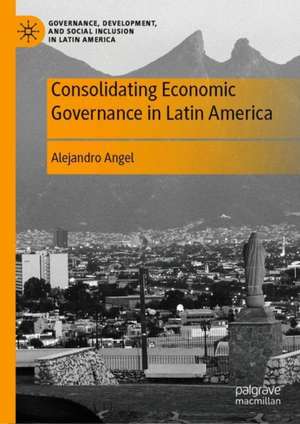Consolidating Economic Governance in Latin America: Governance, Development, and Social Inclusion in Latin America
Autor Alejandro Angelen Limba Engleză Hardback – 3 ian 2021
| Toate formatele și edițiile | Preț | Express |
|---|---|---|
| Paperback (1) | 725.43 lei 6-8 săpt. | |
| Springer International Publishing – 4 ian 2022 | 725.43 lei 6-8 săpt. | |
| Hardback (1) | 729.36 lei 6-8 săpt. | |
| Springer International Publishing – 3 ian 2021 | 729.36 lei 6-8 săpt. |
Preț: 729.36 lei
Preț vechi: 889.47 lei
-18% Nou
Puncte Express: 1094
Preț estimativ în valută:
139.58€ • 151.56$ • 117.25£
139.58€ • 151.56$ • 117.25£
Carte tipărită la comandă
Livrare economică 22 aprilie-06 mai
Preluare comenzi: 021 569.72.76
Specificații
ISBN-13: 9783030645212
ISBN-10: 3030645215
Pagini: 316
Ilustrații: XXI, 263 p. 2 illus.
Dimensiuni: 148 x 210 x 22 mm
Greutate: 0.49 kg
Ediția:1st ed. 2021
Editura: Springer International Publishing
Colecția Palgrave Macmillan
Seria Governance, Development, and Social Inclusion in Latin America
Locul publicării:Cham, Switzerland
ISBN-10: 3030645215
Pagini: 316
Ilustrații: XXI, 263 p. 2 illus.
Dimensiuni: 148 x 210 x 22 mm
Greutate: 0.49 kg
Ediția:1st ed. 2021
Editura: Springer International Publishing
Colecția Palgrave Macmillan
Seria Governance, Development, and Social Inclusion in Latin America
Locul publicării:Cham, Switzerland
Cuprins
Chapter 1. Complementarity and Economic Governance.- Chapter 2. Economic Governance in Latin America: Development as Economic Policymaking.- Chapter 3. The Real Plan: The Successful Struggle to Consolidate Governance.- Chapter 4. The Chilean Pension System: Contentious Economic Governance.- Chapter 5. Institutionalizing Mexican Economic Policies: Limiting Presidential Discretion.- Chapter 6. Limiting Discretion: The Problem of Economic Governance.
Notă biografică
Alejandro Angel is Researcher at Universidade Federal de Santa Catarina, Brazil.
Textul de pe ultima copertă
This book explains how Latin American countries consolidate economic governance after serious disruptions to their formal and informal policy making routines. It asserts that the process of institutional change that started as a result of such disruptions resulted in complementary institutions, which supported a new consolidated pattern of economic governance. In addition, this work also offers a robust theoretical underpinning to economic governance, independent from performance. Performance figures prominently as a criterion to assess economic governance; however, crises are becoming more frequent and performance does not entirely depend on governments’ actions. This book argues that governance in the economic arena depends on the ability and feasibility of limiting the discretion of vested interests over economic policies insofar as these interests can shift the costs of their actions so the rest of the society bears them.
Alejandro Angel is Researcher at Universidade Federal de Santa Catarina, Brazil.
Caracteristici
Explains how Latin American countries consolidate economic governance after serious disruptions to their policy making routines Offers a robust theoretical underpinning to economic governance, independent from performance Proposes that governance in the economic arena depends on the ability and feasibility of limiting the discretion of vested interests over economic policies.















